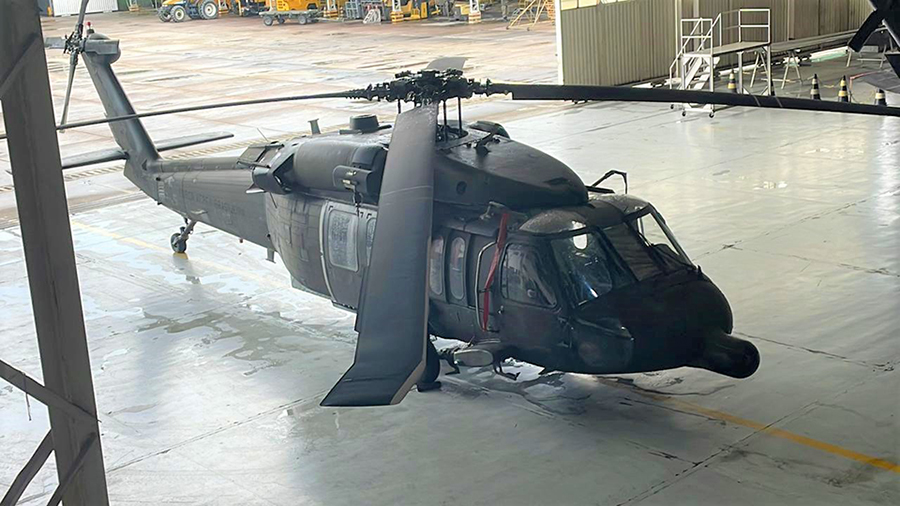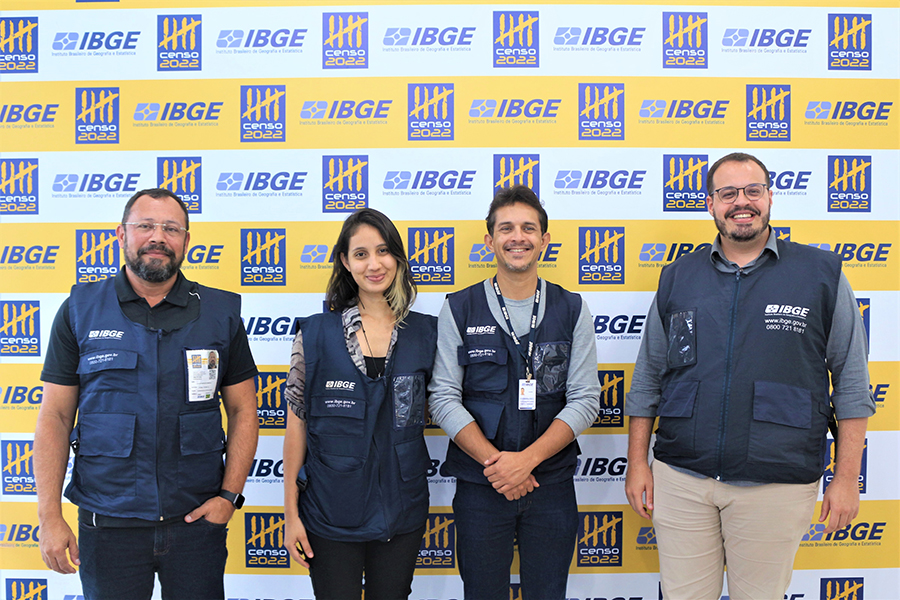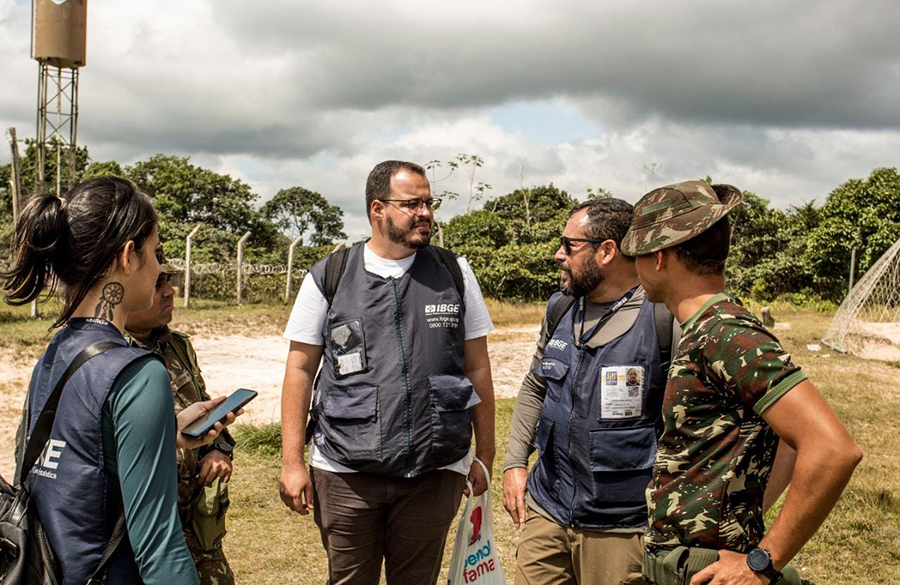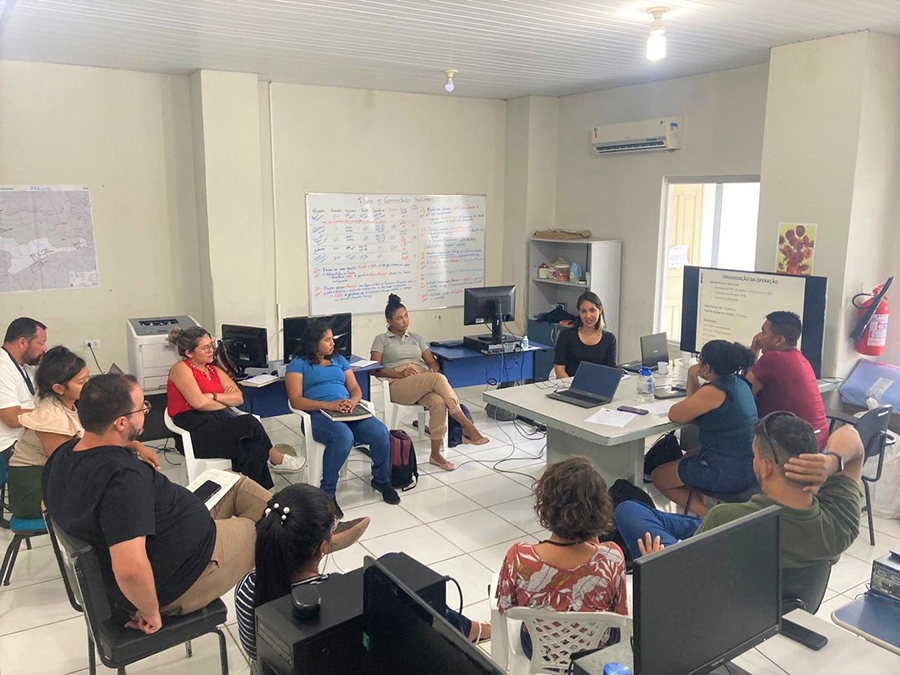IBGE articulates unprecedented support of Air Force to complete the Census in Yanomami and Waijãpi Indigenous lands
February 06, 2023 19h04 | Last Updated: February 14, 2023 16h43
The IBGE has taken part in meetings to adjust details of the unprecedented support of the Brazilian Air Force (FAB), aiming at completing the enumeration of the resident population in the Yanomami Indigenous Land, in the states of Roraima and Amazonas, and in the Waijãpi Indigenous Land, in the state of Amapá. The logistic support will be provided by the 7th Squad of the 8th Aviation Group - Harpia Squad, headquartered in Manaus-AM.
The flights aim at enabling the access of enumerators, FUNAI guides and interpreters to apply the Census questionnaires to residents of nearly 100 communities, in which 15 thousand Indigenous people are expected to live, whose form of access is no other than helicopters.

Fernando Damasco, Manager of Traditional Territories, explain that the IBGE team came to close the details of the operation to enumerate Indigenous lands. According to Damasco, 50% of the Yanomami Indigenous Land have been enumerated until now, and the other 50% depend on the support of helicopters. “It represents nearly 100 communities, which we can effectively access with the support of rotary wings,” explains him. During these meetings, “we managed to look at each community, how we will structure the operation, the amount of flight hours required, how many stretches will be covered, the type of aircraft to be used, etc.,” said him.
The details of the operational planning were discussed during the meetings in the hangar of the Harpia Squad on January 30-31, with the participation of the General Coordinator of Census Operations, Cláudio Marques, of the DGC/CETE´s Manager of Traditional Territories, Fernando Damasco, of the IBGE Superintendent in Amazonas, Ilcleson Mendes, and of the Analyst of Traditional Peoples and Communities of the IBGE Superintendence in Roraima, Joana Praxedes.

The final data collection operation in the Yanomami Indigenous Land will require the line-up of several institutions. Meetings with FUNAI, SESAI, Brazilian Army and Federal Police are being made to coordinate the work. Also on February 2, the General Coordinator of Census Operations visited the 4th Special Border Platoon, in the locality of Surucucu, in Alto Alegre (Roraima), which will be the major IBGE operation site in the Indigenous land and from which the helicopters will depart to the communities. The purpose of the visit was checking the infrastructure condition to lodge the team with nearly 50 persons, among enumerators, guides and interpreters who will be responsible for the data collection.

According to Cláudio Marques, “the partnership with FAB is strategic for the IBGE, as it allows survey teams to safely access remote localities difficult to access, reinforcing the IBGE commitment to access the entire national territory.”
The operation will use aircrafts with rotary wings type H-60 Black Hawk and with fixed wings C-105 Amazonas. The joint operation among the Superintendencies of Amazonas and Roraima in the Yanomami Indigenous Land, based on the locality of Surucucu, will count with 18 data collection teams working simultaneously in several regions of the Indigenous land with a complex operation planning to enable lodging, coverage and infrastructure required for the job.

For Fernando Damasco, the current priority is to guarantee the conclusion of the enumeration of the Yanomami: “With the decree of emergency in public health in the Yanomami Indigenous Land by the Presidency of the Republic, the major challenge is to enable the continuation of the Census in parallel with emergency actions to support the Yanomami, who are the priority today. We are raising awareness of the governmental actors about the importance of the conclusion of the Population Census to provide reliable data on the reality of the Indigenous lands. The Census should be perceived as part of and as a subsidy to the work of the governmental task force of humanitarian aid.
Fundamental support
The Manager of Traditional Territories, Fernando Damasco, explains that as the IBGE only accesses remote lands at each Census, it has not a major experience in hiring air transportation, “so we prioritize partnerships with public bodies that address these areas, which is what the IBGE is trying with several institutions,” said him. Damasco also told that, during the Census, the IBGE was supported by FUNAI, which partially addressed the demand of flight hours required, so the IBGE approached FAB. “Today, the Yanomami Indigenous Land has many demands of emergency care and now they gathered the conditions for us to conclude the Census,” noted him.

According to Damasco, now is the time to unfold the information with the IBGE´s technical staff, “so we will establish who will compose the teams, how much time they will stay in the field, how will be the support logistics, because we will have to build a special camping in Surucucu to shelter our teams,” explains him. To conclude, he said that a detailed planning is fundamental: “it is an operation that will take place in 19 days and should not have any mistake or imprecision, so it is a logistics of major complexity. The Air Force is also preparing to start up the operation along the month of February or, at the latest, in the beginning of March.”
